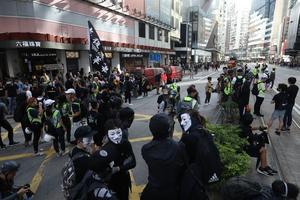 Black-clad protesters take part in an illegal assembly in Causeway Bay, Hong Kong, Nov 2, 2019. (PHOTO / CHINA DAILY)
Black-clad protesters take part in an illegal assembly in Causeway Bay, Hong Kong, Nov 2, 2019. (PHOTO / CHINA DAILY)
The Court of Appeal of the Hong Kong Special Administrative Region on Thursday ruled constitutional a government ban on wearing face masks at unauthorized public assemblies.
However, it also ruled that applying the anti-mask law to authorized rallies, or granting police the authority to demand masks be removed in public areas, would be in violation of the Basic Law.
A legal expert believes the verdict clarifies the division of power between the special administrative region’s executive body and the legislature, while also showing respect to Hong Kong citizens’ freedom of assembly and demonstration
A legal expert believes the verdict clarifies the division of power between the special administrative region’s executive body and the legislature, while also showing respect to Hong Kong citizens’ freedom of assembly and demonstration.
The judgment came after the SAR government appealed a High Court judgment on Nov 18 that ruled that the Emergency Regulations Ordinance violated the Basic Law, and that it was unconstitutional for the government to introduce the Prohibition on Face Covering Regulation, or anti-mask law, under the ordinance.
In Thursday’s judgment, the Court of Appeal stressed that as an integral option for tackling emergencies and public danger, the ordinance is constitutionally compliant.
The court pointed out that if the ordinance were held to be unconstitutional, it would leave a significant gap in the law.
In addition, the Hong Kong chief executive would be deprived of the power to respond swiftly, flexibly and sufficiently even though the circumstances clearly warrant it and it would be in the public interest to do so, the court added.
It also stressed that the general legislative power belongs to the Legislative Council. Such a constitutional order will not be changed by the chief executive’s limited power to make subordinate legislation by virtue of a specific enabling ordinance.
Furthermore, the court noted that rights of demonstration and assembly are not absolute. Restriction on freedom of public assembly could be served to maintain public safety and public order, the court pointed out. Hence, the section of the anti-mask law that bans face coverings at unauthorized assemblies is constitutional, the court said.
However, the court said it is not justified to put more such restrictions on authorized assembly in the name of public danger. The government has the power to regulate safe and peaceful conduct of lawful assembly, and the power to disperse a gathering if it is hijacked by violent or disorderly conduct, it stressed.
Another section of the anti-mask law, which allows police to require people to remove face masks in public areas, was also ruled unconstitutional.
It involves a temporary restriction on the liberty of a person, and an interference of the privacy of a person, the court said.
The police already have the statutory power to order a person to reveal his or her identity by removing the facial covering under the Police Force Ordinance and the Public Order Ordinance, the court pointed out.
Such powers are sufficient to address the law enforcement objectives, and it’s unjustified to have a wider power envisaged under the anti-mask law, the court stressed.
Barrister Ronny Tong Ka-wah thinks the judgment clarifies the division of power between the executive body and the legislature. It shows that it’s constitutional for the chief executive to make a temporary regulation by invoking the Emergency Regulations Ordinance, but specific sections of the regulation may still violate the Basic Law.
The court also has the power to review such a regulation with checks and balances, said Tong, who is also a member of the Executive Council.
He also noted that the part of the ruling on police power reflects respect and protection of people’s rights and freedom.
The anti-mask law was made effective on Oct 5 to stifle violent protests by masked mobs.
Twenty-four opposition lawmakers and activist Leung Kwok-hung lodged a judicial review on the anti-mask law immediately after it came into effect.


